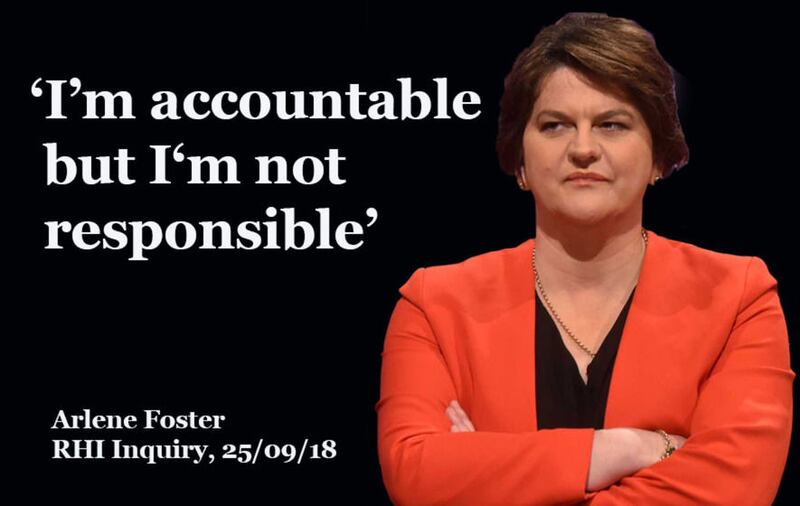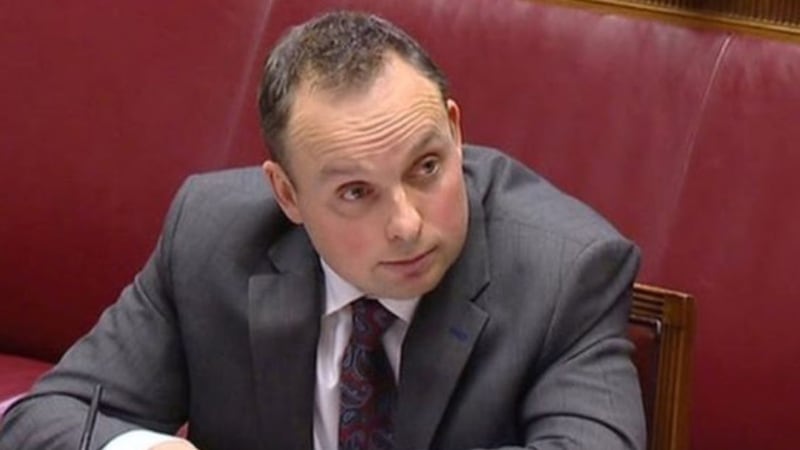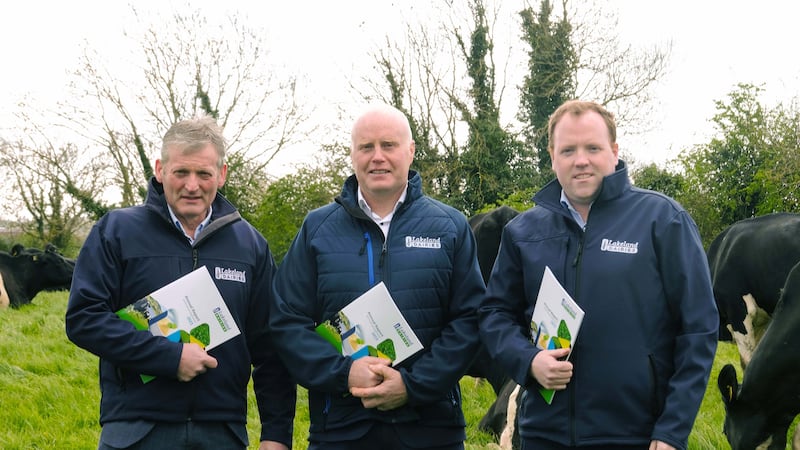While there was no corrupt or malicious activity on the part of officials, ministers or special advisers (spads), Renewable Heat Incentive inquiry chair Sir Patrick Coghlin' has found, there was "unacceptable behaviour."
In a series of damning findings, Sir Patrick Coghlin's report, which runs to more than 650 pages, said the scheme was "highly risky" but that those risks were not understood by everyone involved in the Northern Ireland government.
The inquiry made some criticism of current DUP leader and First Minister Arlene Foster’s role in developing the ill-fated RHI scheme and also highlighted “unacceptable behaviour” by several of her party’s special advisers.
But the probe, chaired by retired judge Sir Patrick Coghlin, said it would be wrong to blame specific individuals or groups for the design flaws that saw applicants “perversely incentivised” to burn excess heat to turn a profit.
This is what the report had to say about indivduals at the heart of the scandal:
Andrew Crawford
Former DUP special adviser Andrew Crawford gave confidential information to his family and other "external parties" about the Renewable Heat Incentive scheme.
In one of the strongest lines in the report, chair Sir Patrick Coghlin said it was "totally unacceptable" that Mr Crawford had given out the information.
The report found Mr Crawford should have written to the head of the Department of Finance, saying that he had family members involved in the scheme and he had close links to the poultry industry.
Given his conflict of interest, Mr Crawford should not have been involved on advising on a key DETI document about the "poultry industry's significant contribution to the overspend on the RHI scheme".
Mr Crawford, a special adviser to finance minister Arlene Foster, was strongly criticized for not telling her in July 2015 that there would be a "massive spike" in applications and for not making her aware that the tariffs were being exploited to earn money.
"The Inquiry finds this unacceptable considering the potential financial impacts that would very clearly be of interest to Ms Foster as Minister for DFP."
Mr Crawford was also criticised for suggesting an amendment to cost controls in July 2015 which, if implemented, would still have made the scheme "overgenerous to participants, and to poultry farmers in particular".
The report found that Mr Crawford's suggestions were aimed at benefiting poultry farmers and indirectly poultry giant Moy Park "an industry in which Dr Crawford's family was clearly involved".
However, despite conflicting testimony from senior civil servant Dr Andrew McCormick and Mr Crawford, the report found the Spad "did not deliberately delay the introduction of cost controls".
Arlene Foster
Arlene Foster or her former special adviser Andrew Crawford should have asked for a draft 2011 report carried out by a consultancy firm into how best to run the Renewable Heat Incentive scheme, a landmark report has found.
The CEPA report highlighted one approach as the best option. But subsequent reports contained "substantial errors". RHI inquiry chair Sir Patrick Coghlin found that senior civil servant Fiona Hepper did not properly explain to Mrs Foster that the scheme posed a risk to the department's block grant.
And that this lack of clarity meant that Mrs Foster would not have properly appreciated the need for budget controls.
However, he found that either Mrs Foster or Mr Crawford should have asked for a copy of the draft CEPA report.
Sir Patrick also found that Mrs Foster and/or Mr Crawford should have asked more questions and Mrs Foster should not have signed a key document without seeking all of the information needed.
But that the minister should also have been told in March 2012 that the predicted cost of the scheme had risen from £334 million to £445 million.
She was also not told that in trying to save a few million pounds in administrative costs, there was also an alternative scheme which could have saved up to £300 million in subsidies.

Jonathan Bell and Timothy Cairns
When Jonathan Bell became energy minister he felt he had no choice but to accept the appointment of his special adviser, Timothy Cairns, a situation that “fundamentally undermined” the personal nature of the appointment and the high degree of trust required.
A breakdown in trust between Mr Bell and Mr Cairns made resolving problems with the Renewable Heat Incentive scheme "more difficult", a report into the botched scheme has found.
While Mr Bell's testimony was among the most striking of all the witnesses to the inquiry, his role in the scheme only merited a few paragraphs in the inquiry's findings.
The inquiry found no objective evidence to support Mr Bell’s allegation that Mr Cairns intervened to keep RHI matters off the agenda at meetings.
Submissions to close the scheme early in 2016 were discussed between energy minister Mr Bell and his special adviser. Collective lack of clear leadership led to “unnecessary delay” in clearing submissions.
[ Read more: Who is ex-DUP adviser Timothy Cairns?Opens in new window ]
Michelle O’Neill
Sinn Fein leader Michelle O’Neill’s agriculture department should have made the then named Department for Enterprise, Trade and investment (DETI) aware of “excessively generous” rewards for participants.
Officials seemed to believe that people would not abuse the scheme.
“A culture which allows such blinkered belief in the correctness of their approach is of significant concern to the Inquiry and must not be allowed to continue, if such a situation is to be avoided in the future.”
Department for Enterprise, Trade and investment (DETI)
Sir Patrick Coghlin was particularly critical of the Stormont department in charge of the scheme, the then named Department for Enterprise, Trade and investment (DETI).
The inquiry did not believe it would have been impossible to agree wording which allowed Northern Ireland to be included in the Great Britain scheme or UK-wide version.
The difference was that in Northern Ireland a price cap was not imposed and this allowed costs to rise.
“The small team was simply not provided with the necessary knowledge or experience to carry out the necessary activities, to analyse the information it received, to make the necessary judgments nor was there any adequate effort to access expertise in other parts of the Northern Ireland Government.”
Failings around project management and the RHI scheme were more “unacceptable” since throughout its life Deti was actively considering failings from previous projects.
It is unlikely that official Fiona Hepper, former head of the renewable energy team, “adequately and effectively” explained to former energy minister Arlene Foster the potential risk to Stormont’s budget caused by overspending.
“Not ensuring that the minister clearly understood about the restricted comparison provided continuing misleading confidence about the value for money of the Northern Ireland RHI scheme.
The extent of staff turnover in 2013/14 at the division overseeing the scheme robbed it of skills and knowledge already acquired and should have been escalated to top management – suggesting lack of leadership.
Officials appear to have had no commercial awareness about the potential impact of the information (about changes to the scheme) they were providing.
The “selective nature” of officials’ contacts was capable of producing significant market distortion by providing commercially sensitive information to some parties but not others.
RHI explained
- The scandal that pulled down Stormont
- More than £230,000 paid to 20 businesses in three months
- The role of DUP special advisers
- Arlene Foster: A key figure in cash-for-ash
Was the controversial RHI scheme avoidable?
— Stephen Nolan (@StephenNolan) December 15, 2016
Former Minister J Bell / #NolanRHI pic.twitter.com/CrdXvfCd2K
Jonathan Bell prays before an interview with the BBC's Stephen Nolan
Full transcript of Jonathan Bell's interview with Stephen Nolan








